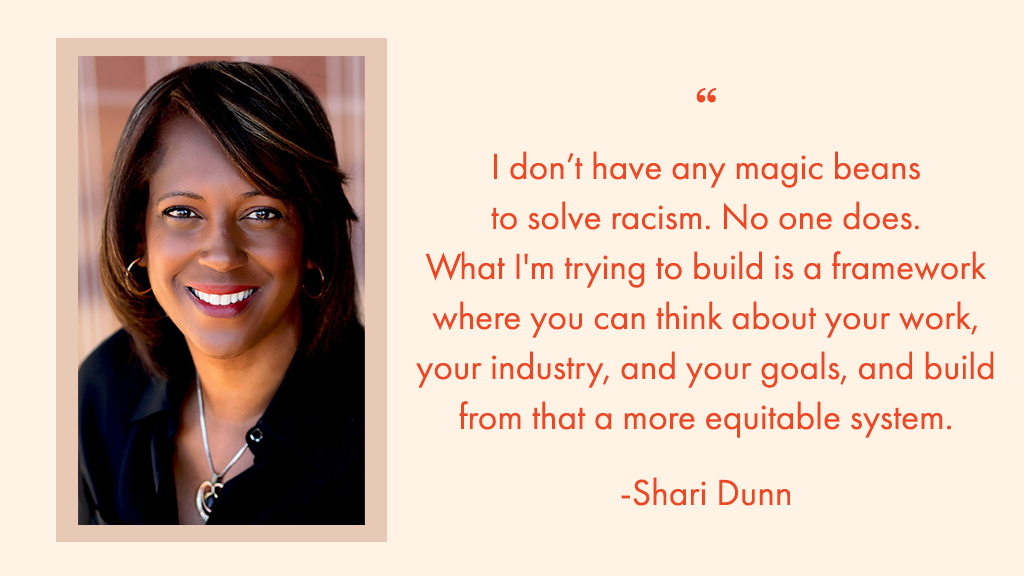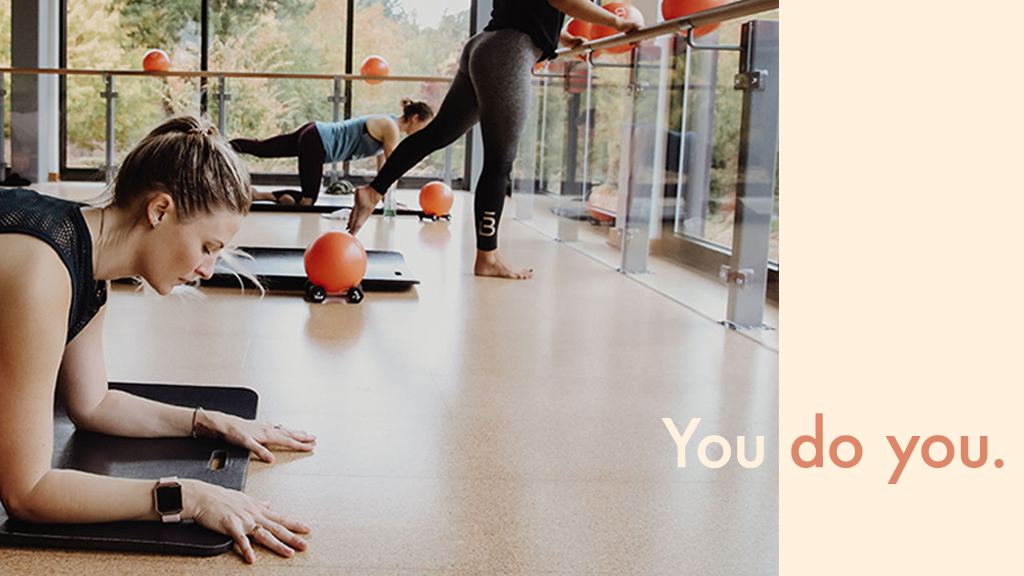Black History Month
Diversity, Equity, and Inclusion at barre3: An Update
Back in June, in the wake of the brutal murders of George Floyd, Breonna Taylor, and Ahmaud Arbery, we made a commitment to change as a company. As barre3 co-founders Chris and Sadie Lincoln explained in their letter to our community, the devastating events helped us see how pervasive racism is in our systems, in our homes, in our workplaces, in wellness, and at barre3. We pledged to dig into the real, lifelong work, and we promised to give you updates.
The barre3 Leadership and home office teams have spent the past seven months digging into Diversity, Equity, and Inclusivity, including a lot of listening, learning, reading, questioning, and discussing. Instrumental in all of this work has been our DEI partner, ITBOM LLC Consulting, founded and led by Shari Dunn. We recently chatted with Shari about how she came to this line of work, how DEI training is like strengthening a muscle in your body, and why she uses a bespoke approach to DEI consulting. Read on for our conversation, and for details on the work barre3 has done so far and what you can expect from us in the coming months.
B3 MAGAZINE: Attorney, news anchor, CEO, professor, thinker, agent of change, and game-show winner. To say you’ve worn a lot of hats is an understatement!
SHARI: I’ve always been interested in a variety of things, and when I’m into something, I’m 100% in it. I used to love trivia, and I was a winner on the daytime version of Who Wants To Be A Millionaire (not the million-dollar winner, LOL). When I look back at my career, I think of it like climbing a mountain, even though I only climb figurative mountains. When you’re climbing, you always have to figure out where your next hold is going to be. I see my life as a mountain. Falling could have serious consequences, so I always need to think, where is my next hold, and how can I use this to move to the next to keep going?
B3 MAGAZINE: Is there a throughline that connects your past professional experience with where you are today?
SHARI: In every job I’ve done, I always noticed issues around equity. When I was practicing law, I worked with women who were victims of domestic violence, and I noticed equity issues in how the judges handled the cases. Later I had the opportunity to go to Washington D.C. to work for the National Legal Aid and Defender Association, and I noticed that there weren’t a lot of Black people in my field. I realized it was an equity issue: Working in legal services doesn’t pay well, so the people who can take the jobs are people with means, people with financial support beyond their paycheck. Traditionally, Black people don’t have as much generational wealth, so they can’t afford to take these jobs. I realized that the people most impacted by the issues we were working on can’t do the work. I also saw a disparity in who gets to make policy.
After that I had the opportunity to run a foundation called Power of Attorney. This role taught me so much and shaped how I looked at philanthropy, but even there, I saw inequity. At that time, the people doing foundation work were mostly white women. I realized these systems are supposed to be designing solutions for underrepresented people, but they had no representation—though that is changing. I started trying to be that voice. I led large-scale trainings, came up with curriculums, designed learning programs, all to help bring an element of equity.
B3 MAGAZINE: From there, you did a major pivot to work in news, and later took a job as Executive Director for Dress For Success in Portland. Did you continue to see equity issues arise in these roles?
SHARI: I did. After spending a decade in news, I had initially wanted to make the pivot to PR, like I had seen so many others in journalism do. But I just wasn’t getting the jobs even though I was just as qualified as the others. Then I decided I wanted to bring my skills to something that mattered. At Dress For Success, I had the chance to use every single skill I had every day—what I had learned as a lawyer, my experience in federal and private funding, my understanding of messaging from my time in media. I was able to do a lot of innovative things and had success, but again, there are equity issues in nonprofit work. It was challenging, especially as a Black woman—people aren’t always used to Black authority.
B3 MAGAZINE: Was it this throughline of equity that led you to start your own DEI consulting business?
SHARI: The recurring theme around equity definitely opened my eyes to the problem. At the same time, I saw some equity work that I didn’t find useful, and I had an idea that I could do a better job, that I could bring something different to the experience. So I went out on my own. This was right around the same time George Floyd was murdered. I’m very cognizant of the fact that my success is related to someone’s murder. That pushes me; I want to stay connected to that. I need to work hard to fulfill that legacy.
B3 MAGAZINE: That timing is so powerful. I imagine you were inundated with calls from companies asking for help. What was that like?
SHARI: A lot of companies and organizations reaching out were feeling panic, they were emotional, they were experiencing moral confusion. I was contacted by a lot of people who hadn’t done any of the work yet, and by companies that had been doing DEI work over the years but were frustrated because it hadn’t moved the needle. They wanted something different.
B3 MAGAZINE: That was one of the key reasons barre3 was so excited about working with you—because you could offer something different. Can you talk about what makes your approach unique?
SHARI: My approach is to take it from a bespoke perspective because that’s one thing I understood was missing in existing DEI work. This is the hallmark of my work: I try to tie it to the industry I’m working with. If I can explain things in a way that speaks to you and to your specific industry, it’s more likely to stick. It can’t just be the same program for everyone. You have to dig deeper, understand the organization before you can start implementing any changes.
B3 MAGAZINE: That sounds both smarter and more complicated than a one-size-fits-all approach to DEI training.
SHARI: It’s not a quick-fix. People who hire me are choosing to do the work. That’s what I saw in barre3: a genuine desire to do the work.
B3 MAGAZINE: At our Owners Summit last fall, you gave a great talk where you said that calling out the systemic racism in our country is like discovering an imbalance in the body: It’s an opportunity to learn, grow, and strengthen. But just as we wouldn’t pick up a 100-pound weight to strengthen a muscle we’ve never worked before, we can’t dive into this work without first pausing, seeking to understand, and educating ourselves. You described this as not a place of inaction, but a place of interaction. Can you explain what this period has looked like for barre3?
SHARI: We started with what I call a discovery time. This is where we lay the foundation for the work ahead—without that foundation, any training is useless. I can train and leave and people have no idea what we’re talking about. Instead, I work to bring context to DEI work. My goal is to build knowledge. I don’t give a list of ways to “fix” systemic racism in an organization. I enlist the organization to help come up with solutions that they are invested in.
BARRE3: For us, this discovery time has taken place with the barre3 Leadership Team and the home office, with the understanding that once we’ve built a foundation, we can roll it out to the rest of the company. Can you talk about some of the key things we’ve dug into together during this phase, both about systemic racism in our country and in our organization?
SHARI: I always ask my clients to educate themselves about race and racism in general, and about race and racism in their industry. Barre3 has been really connecting the dots to understand how these issues are systemic, both in the world and in their industry. The barre3 leadership teams and members of the home office have spent time in conversation with me, with my collaborator, Alicia, with the barre3 DEI group, and with the barre3 DEI book club. You’re digging into big issues, like reshaping how you want to talk about yourselves as a company and looking at who you are and where you want to go.
BARRE3: So to use your earlier analogy, this was our phase of acknowledging the imbalance and seeking to understand. It’s only recently that we’ve begun to exercise the muscle by doing training around DEI.
SHARI: Right, after we did this work, then we brought on training. So far, we’ve trained on unconscious bias and communication. Next comes implementation. We’ll be ready to start to make authentic outreach to a variety of organizations and individuals of color. We’ll be looking at our own hiring practices and creating pipelines for hiring. We’ll start the work toward diversifying internally. We’ll start to present metrics for how we measure our progress and growth in this area. The final steps are all about figuring out how we standardize this, how we make it something we do not just occasionally but always.
B3 MAGAZINE: I think most people understand by now that DEI work isn’t something you can ever be finished with, and that’s one of the reasons your method appealed to barre3. We’re not doing this work for a DEI certificate or a stamp of approval. We’re doing it so that we have a foundation that enables us to continue to do the work, every day and in all aspects of our company.
SHARI: I don’t have any magic beans to solve racism. No one does. What I’m trying to build is a framework where you can think about your work, your industry, and your goals, and build from that a more equitable system.
Thank you so much, Shari and your team at ITBOM LLC, for guiding us through this important, lifelong work. You can learn more about ITBOM LLC here, and about Shari here.
Back in June, in the wake of the brutal murders of George Floyd, Breonna Taylor, and Ahmaud Arbery, we made a commitment to change as a company. As barre3 co-founders Chris and Sadie Lincoln explained in their letter to our community, the devastating events helped us see how pervasive racism is in our systems, in our homes, in our workplaces, in wellness, and at barre3. We pledged to dig into the real, lifelong work, and we promised to give you updates.
The barre3 Leadership and home office teams have spent the past seven months digging into Diversity, Equity, and Inclusivity, including a lot of listening, learning, reading, questioning, and discussing. Instrumental in all of this work has been our DEI partner, ITBOM LLC Consulting, founded and led by Shari Dunn. We recently chatted with Shari about how she came to this line of work, how DEI training is like strengthening a muscle in your body, and why she uses a bespoke approach to DEI consulting. Read on for our conversation, and for details on the work barre3 has done so far and what you can expect from us in the coming months.
B3 MAGAZINE: Attorney, news anchor, CEO, professor, thinker, agent of change, and game-show winner. To say you’ve worn a lot of hats is an understatement!
SHARI: I’ve always been interested in a variety of things, and when I’m into something, I’m 100% in it. I used to love trivia, and I was a winner on the daytime version of Who Wants To Be A Millionaire (not the million-dollar winner, LOL). When I look back at my career, I think of it like climbing a mountain, even though I only climb figurative mountains. When you’re climbing, you always have to figure out where your next hold is going to be. I see my life as a mountain. Falling could have serious consequences, so I always need to think, where is my next hold, and how can I use this to move to the next to keep going?
B3 MAGAZINE: Is there a throughline that connects your past professional experience with where you are today?
SHARI: In every job I’ve done, I always noticed issues around equity. When I was practicing law, I worked with women who were victims of domestic violence, and I noticed equity issues in how the judges handled the cases. Later I had the opportunity to go to Washington D.C. to work for the National Legal Aid and Defender Association, and I noticed that there weren’t a lot of Black people in my field. I realized it was an equity issue: Working in legal services doesn’t pay well, so the people who can take the jobs are people with means, people with financial support beyond their paycheck. Traditionally, Black people don’t have as much generational wealth, so they can’t afford to take these jobs. I realized that the people most impacted by the issues we were working on can’t do the work. I also saw a disparity in who gets to make policy.
After that I had the opportunity to run a foundation called Power of Attorney. This role taught me so much and shaped how I looked at philanthropy, but even there, I saw inequity. At that time, the people doing foundation work were mostly white women. I realized these systems are supposed to be designing solutions for underrepresented people, but they had no representation—though that is changing. I started trying to be that voice. I led large-scale trainings, came up with curriculums, designed learning programs, all to help bring an element of equity.
B3 MAGAZINE: From there, you did a major pivot to work in news, and later took a job as Executive Director for Dress For Success in Portland. Did you continue to see equity issues arise in these roles?
SHARI: I did. After spending a decade in news, I had initially wanted to make the pivot to PR, like I had seen so many others in journalism do. But I just wasn’t getting the jobs even though I was just as qualified as the others. Then I decided I wanted to bring my skills to something that mattered. At Dress For Success, I had the chance to use every single skill I had every day—what I had learned as a lawyer, my experience in federal and private funding, my understanding of messaging from my time in media. I was able to do a lot of innovative things and had success, but again, there are equity issues in nonprofit work. It was challenging, especially as a Black woman—people aren’t always used to Black authority.
B3 MAGAZINE: Was it this throughline of equity that led you to start your own DEI consulting business?
SHARI: The recurring theme around equity definitely opened my eyes to the problem. At the same time, I saw some equity work that I didn’t find useful, and I had an idea that I could do a better job, that I could bring something different to the experience. So I went out on my own. This was right around the same time George Floyd was murdered. I’m very cognizant of the fact that my success is related to someone’s murder. That pushes me; I want to stay connected to that. I need to work hard to fulfill that legacy.
B3 MAGAZINE: That timing is so powerful. I imagine you were inundated with calls from companies asking for help. What was that like?
SHARI: A lot of companies and organizations reaching out were feeling panic, they were emotional, they were experiencing moral confusion. I was contacted by a lot of people who hadn’t done any of the work yet, and by companies that had been doing DEI work over the years but were frustrated because it hadn’t moved the needle. They wanted something different.
B3 MAGAZINE: That was one of the key reasons barre3 was so excited about working with you—because you could offer something different. Can you talk about what makes your approach unique?
SHARI: My approach is to take it from a bespoke perspective because that’s one thing I understood was missing in existing DEI work. This is the hallmark of my work: I try to tie it to the industry I’m working with. If I can explain things in a way that speaks to you and to your specific industry, it’s more likely to stick. It can’t just be the same program for everyone. You have to dig deeper, understand the organization before you can start implementing any changes.
B3 MAGAZINE: That sounds both smarter and more complicated than a one-size-fits-all approach to DEI training.
SHARI: It’s not a quick-fix. People who hire me are choosing to do the work. That’s what I saw in barre3: a genuine desire to do the work.
B3 MAGAZINE: At our Owners Summit last fall, you gave a great talk where you said that calling out the systemic racism in our country is like discovering an imbalance in the body: It’s an opportunity to learn, grow, and strengthen. But just as we wouldn’t pick up a 100-pound weight to strengthen a muscle we’ve never worked before, we can’t dive into this work without first pausing, seeking to understand, and educating ourselves. You described this as not a place of inaction, but a place of interaction. Can you explain what this period has looked like for barre3?
SHARI: We started with what I call a discovery time. This is where we lay the foundation for the work ahead—without that foundation, any training is useless. I can train and leave and people have no idea what we’re talking about. Instead, I work to bring context to DEI work. My goal is to build knowledge. I don’t give a list of ways to “fix” systemic racism in an organization. I enlist the organization to help come up with solutions that they are invested in.
BARRE3: For us, this discovery time has taken place with the barre3 Leadership Team and the home office, with the understanding that once we’ve built a foundation, we can roll it out to the rest of the company. Can you talk about some of the key things we’ve dug into together during this phase, both about systemic racism in our country and in our organization?
SHARI: I always ask my clients to educate themselves about race and racism in general, and about race and racism in their industry. Barre3 has been really connecting the dots to understand how these issues are systemic, both in the world and in their industry. The barre3 leadership teams and members of the home office have spent time in conversation with me, with my collaborator, Alicia, with the barre3 DEI group, and with the barre3 DEI book club. You’re digging into big issues, like reshaping how you want to talk about yourselves as a company and looking at who you are and where you want to go.
BARRE3: So to use your earlier analogy, this was our phase of acknowledging the imbalance and seeking to understand. It’s only recently that we’ve begun to exercise the muscle by doing training around DEI.
SHARI: Right, after we did this work, then we brought on training. So far, we’ve trained on unconscious bias and communication. Next comes implementation. We’ll be ready to start to make authentic outreach to a variety of organizations and individuals of color. We’ll be looking at our own hiring practices and creating pipelines for hiring. We’ll start the work toward diversifying internally. We’ll start to present metrics for how we measure our progress and growth in this area. The final steps are all about figuring out how we standardize this, how we make it something we do not just occasionally but always.
B3 MAGAZINE: I think most people understand by now that DEI work isn’t something you can ever be finished with, and that’s one of the reasons your method appealed to barre3. We’re not doing this work for a DEI certificate or a stamp of approval. We’re doing it so that we have a foundation that enables us to continue to do the work, every day and in all aspects of our company.
SHARI: I don’t have any magic beans to solve racism. No one does. What I’m trying to build is a framework where you can think about your work, your industry, and your goals, and build from that a more equitable system.
Thank you so much, Shari and your team at ITBOM LLC, for guiding us through this important, lifelong work. You can learn more about ITBOM LLC here, and about Shari here.










0 people have left a comment. Join the conversation!
View Comments